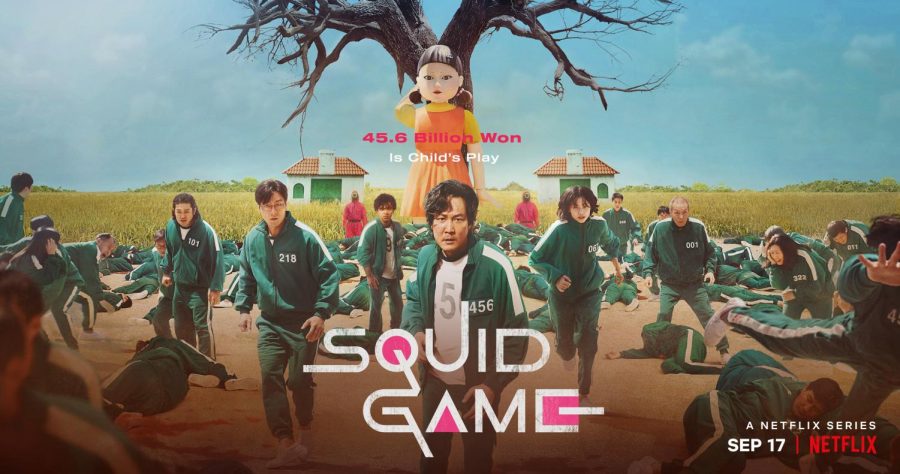Squid Game review: is it worth the hype?
This promotional poster features “Squid Game’s” most recognizable game: red light, green light, one of six deadly children’s games played throughout the series. If the doll catches a player moving after she has announced “red light,” the player will be shot and killed, eliminating them from the game.
The dalgona challenge. Red light, green light parodies. Fanart of player #067. For the past month, it has seemed nearly impossible to escape the insanely popular media craze that is “Squid Game.” With the show’s prominence on all sorts of social media platforms bringing in billions of viewers, the South Korean original series is well on its way to becoming Netflix’s most-watched show internationally.
“Squid Game,” written and directed by Hwang Dong-hyuk, is a South Korean survival drama series released as a Netflix original on September 17th. Immediately, audiences were drawn to the show’s colorful production design, stellar cast and unique concept.
“I feel like I had a predetermined expectation for it because of how much popularity it got on social media,” Ramyla Dahmer (11) said. “Throughout it, I noticed that it exceeded my expectations, and by the end of it, I’m saying it was worth it. Totally. 100 percent.”
The nine-episode series centers on a group of players—all in extreme debt—who are invited by a mysterious organization to play in a set of children’s games. The punishment for losing is death, and the player(s) who are(is) able to survive all six games win the ₩45.6 billion cash prize, equivalent to over $38 billion.
“It would escalate, but it would escalate realistically, without trying to hit … the criteria of the norm of how stories should go in terms of main characters and in terms of who should be the hero and who should be the villain,” Dahmer said. “I think that’s another thing that made it grab so much attention.”
Following its release, “Squid Game” began to appear all over social media, most prominently on TikTok, with #squidgame featuring almost 37 billion videos. The app had users attempting to recreate the Korean sugar honeycomb cookies called dalgona from the show, imagining themselves playing the show’s deadly version of red light, green light and sharing theories and clues hidden throughout the show that viewers may have missed.
“I first heard about it through social media,” Dahmer said. “It was being posted everywhere, and I got curious about what it was about through everyone making inside jokes from watching it. That’s how I knew it was super popular too because everyone was posting about it, so that kind of got me hooked.”
The show’s concept of playing well-known children’s games with deadly stakes captures the audience’s interest. In addition, it’s fun for fans to imagine themselves in green numbered tracksuits and white sneakers as adorned by the players. Imagining the strategies you would employ or who you would team up to beat the six games is entertaining to viewers, and the show effectively reaches out to its audience in this way.
“The show has a really unique concept, and that’s one of the reasons I think so many people were drawn to it,” Ava Blair (11) said. “People like to think about what they would do if they were playing.”
Another aspect of the series that led to its rise in popularity is the show’s effective characterization. Although the players are dressed in identical uniforms, each character has their unique personality and reason for joining the game. “Squid Game” features ten major characters with some fan favorites being Kang Sae-Byeok (#067), a North Korean defector who participates in hopes of reuniting with her family across the border, and Hwang Jun-ho, a police officer who goes undercover as a guard in search of his missing brother.
“Their acting was obviously very good,” Kayden Li (9) said. “The crazy lady with the curly hair [Han Mi-nyeo] did her part very well. She made me hate her. A lot of people hated her because her acting was so good.”
The series had a strong emotional hold on many viewers, and by the sixth episode, it proved that it wasn’t afraid to kill off main characters at any given moment. The series also features substantial amounts of gore: including violent deaths and scenes of organ harvesting. In just the first episode, over 200 players were killed.
“We’re not really used to the rawness and the actual realism given the gore that was seen and the blood and the emotions,” Dahmer said. “I feel like that was one thing that took audiences by surprise, because it was something new but real.”
“Squid Game’s” Korean origins are an important aspect of the show. References to Korean culture can be seen in the children’s games that the players participate in, and Sae-Byeok’s family situation deals with the conflict between North and South Korea. This exposure to culture in Korea caused many fans to look more into these aspects of Korean life.
“I feel like it should have a lasting impression on the viewers,” Li said. “One example is anime. A lot of people wanted to learn the Japanese language after watching anime. They wanted to learn more about the culture, and I feel like that’s the same with Squid Game and Korean shows.”
Despite the desire to learn about Korean culture, a major debate began between viewers of the show whether to view the series in the original Korean audio with English subtitles or to view it in the English voice-over. For many viewers, “Squid Game” was their introduction to international television, so they chose to view it in the English dub to retain the familiarity of the English language. Supporters of the sub argue that the original Korean audio delivers a more impactful feeling to the series, finding the disconnect of the audio and visuals to be confusing and believing that the English dub removes some of the original meaning of the Korean dialogue.
“Because this was such an intense show, I wanted every part of the feeling to dive into this show, and I feel like the English dub undermines the true emotion that can only be heard in the Korean audio,” Dahmer said. “Since it is the original, it allows you to have a deeper connection because you can actually hear what the characters sound like.”
With the show’s immense popularity online and its cliffhanger ending, many fans hope for a second season of “Squid Game.” Netflix has stated that they are willing to work around director Dong-hyuk’s schedule to create a second season, but it may be a while until it is released. In the meantime, Netflix Asia executive Minyoung Kim stated that a Squid Game video game is being considered by the platform.
“It’s too popular to not deserve a season two or at least consideration of a season two,” Dahmer said. “I feel like it’s attracted an interest that will only grow if fed. I feel like our interest needs to be fed since social media has already tackled this show and turned it into their own interpretations, and I feel like it would just be unfair for them to leave us off with an unfinished show.”
Although “Squid Game” seems almost universally enjoyed, younger audiences, especially those present on social media, are what keep interest in the show. Support for the series is sure to continue given the current attitude toward the show, and if Netflix does announce a second season, audiences around the globe will be eagerly awaiting its release.
“I would recommend Squid Game to an audience that likes surprises,” Dahmer said. “If you’re one that doesn’t like surprises and likes to predict what’s next, I would not recommend this show because it is unpredictable, and it will keep you on your toes. For anyone looking for that sort of surprise, although it may not be happy, I would recommend the show.”
Your donation will support the student journalists of White Station High School. Your contribution will allow us to purchase equipment and cover our annual website hosting costs.





































